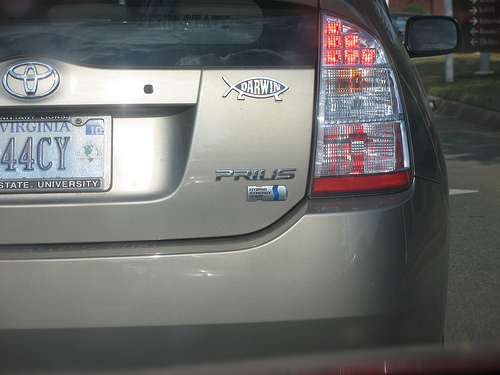 Culture & Ethics
Culture & Ethics
 Evolution
Evolution
When Machines Collide

Jerry Coyne at Why Evolution Is True got upset that someone damaged the fender of his car and then drove off.
Coyne:
Last Saturday afternoon I parked my car in front of my building at work; I usually use it on the weekends and then leave it at work in case I need to use it during the week. On Wednesday I looked out the window of my lab (I can overlook the car, which is nice) to see a huge dent in the front fender on the driver’s side. Going down to investigate, I saw that it was indeed a large, fresh dent, which I photographed this morning.
The hit-and-run driver was nowhere to be found. Luckily, a passerby saw the collision, and got the guy’s license plate number and left a note. Coyne called the cops.
Coyne titled his post “The good and bad of humanity.” The cognitive dissonance is amusing. After all, Coyne has argued emphatically that man has no free will, and “choices” are really determined entirely by biochemistry and history. So “good” and “bad” don’t really apply to humanity. If Coyne is right about free will, then the guy who drove off has no more moral culpability than the car he was driving. The cars and the driver and Coyne himself have no free agency at all. If determinism is true, no other event was possible.
Coyne’s soulless deterministic world is merely an arena in which chance and physics and chemistry play. We’re all meat machines, incapable of free will. So a machine is angry that a machine damaged his machine.
The only flicker of libertarian free will in Coyne’s deterministic dystopia is when someone dents his fender.
